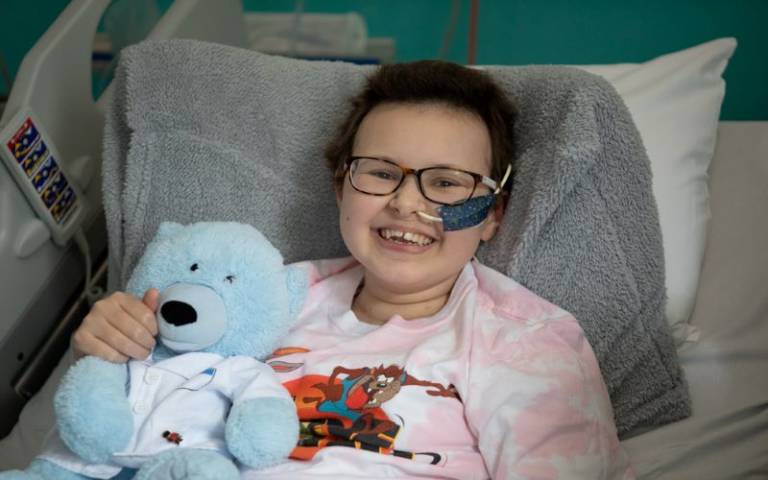A patient with relapsed T-cell leukaemia has been given base-edited T-cells in a world-first use of a base-edited cell therapy, in a 'bench-to-bedside' collaboration between UCL and Great Ormond Street Hospital for Children (GOSH).

The patient, 13-year-old Alyssa from Leicester, was diagnosed with T-cell acute lymphoblastic leukaemia (T-ALL) in 2021. She was treated with all current conventional therapies for her blood cancer, including chemotherapy and a bone marrow transplant, but unfortunately her disease came back and there were no further treatment options.
Alyssa was the first patient to be enrolled onto the TvT clinical trial and in May 2022 she was admitted to the Bone Marrow Transplant (BMT) Unit at GOSH, to receive 'universal' CAR T-cells that had been pre-manufactured from a healthy volunteer donor. These cells had been edited using new base-editing technology, which was designed and developed by a team of researchers at UCL, led by Professor Waseem Qasim (UCL Great Ormond Street Institute of Child Health), who is also an Honorary Consultant at GOSH.
She was then fitted with a Chimeric Antigen Receptor (CAR) to allow them to hunt down and kill cancerous T-cells without attacking each other.
Just 28 days later, Alyssa was in remission and went on the receive a second bone marrow transplant to restore her immune system. Now, six-months post-BMT, she is doing well at home recovering with her family and continues her post-BMT follow-up at GOSH. Without this experimental treatment, Alyssa's only option was palliative care.
Researchers are presenting the data for the first time at the American Society of Haematology annual meeting in New Orleans, USA, this weekend.
Professor Waseem Qasim, Professor of Cell and Gene Therapy at UCL GOS ICH and Consultant Immunologist at GOSH said: "We designed and developed the treatment from lab to clinic and are now trialling it on children from across the UK - in a unique bench to bedside approach.
"Alyssa's story is a great demonstration of how, with expert teams and infrastructure, we can link cutting edge technologies in the lab with real results in the hospital for patients. It's our most sophisticated cell engineering so far and paves the way for other new treatments and ultimately better futures for sick children.
"We have a unique and special environment here at GOSH and UCL that allows us to rapidly scale up new technologies and we're looking forward to continuing our research and bringing it to the patients who need it most."






